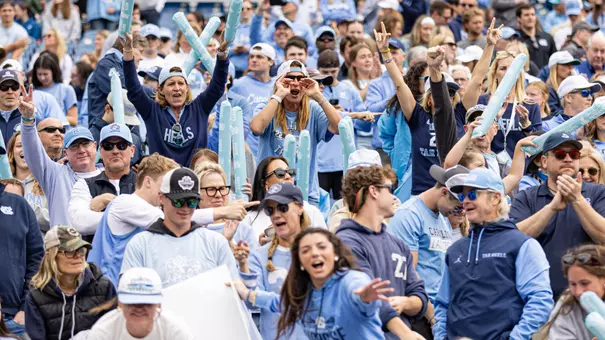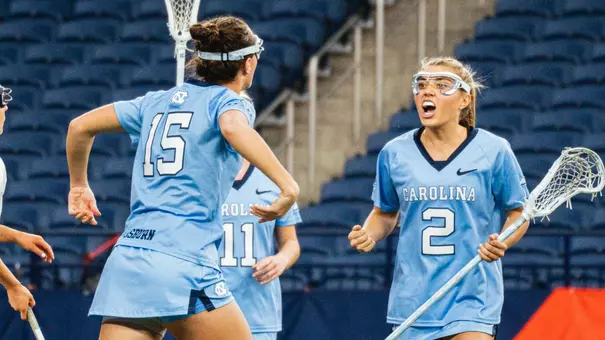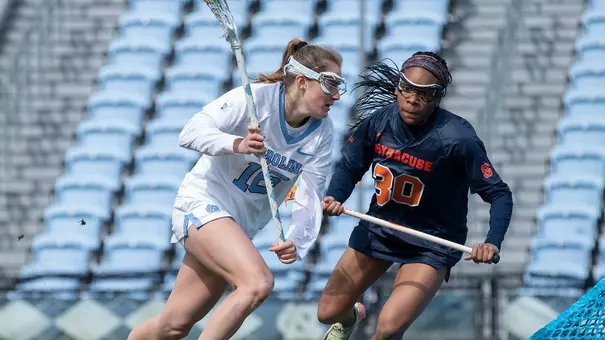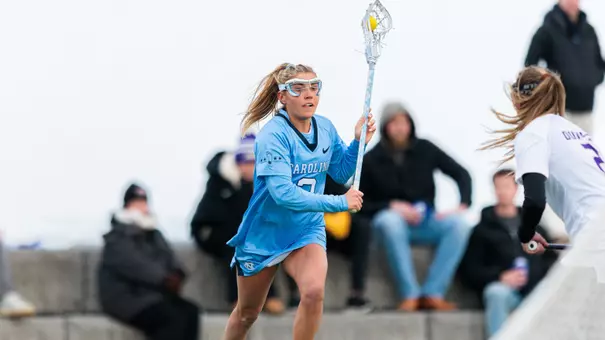University of North Carolina Athletics
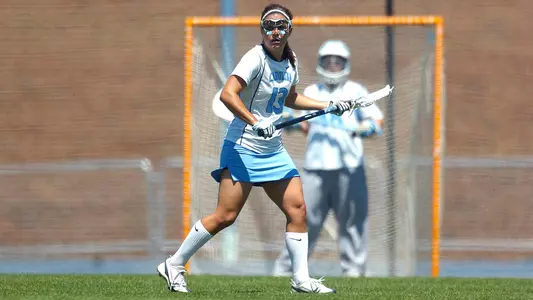
Former Tar Heel Amber Falcone McKenzie became the WPLL Futures program director in February
Photo by: UNC Athletic Communications
GoHeels Exclusive: Shaping The Future Of Women's Lacrosse
May 6, 2020 | Women's Lacrosse, Featured Writers
By Pat James, GoHeels.com
So many times over the last six years, Amber Falcone McKenzie found herself unsure of what would come next.
A year removed from winning her second Women's Lacrosse World Cup in 2013, the former North Carolina standout made the difficult decision to retire from the U.S. national team. When she did, the then-Furman assistant had no intention of stepping away from lacrosse completely.
But as it does, life eventually got in the way.
In early 2016, McKenzie's husband, Norval, became the running backs coach for the Arkansas State football team, prompting a move to Jonesboro, Arkansas – not exactly known as a lacrosse hotbed. As if that wasn't enough to take McKenzie away from the game she loves, the couple welcomed their first child, Storm, a few months later.
Nearly two years went by before McKenzie returned to lacrosse, first as an assistant at the Hutchison School in Memphis, Tennessee, then as a player in the Women's Professional Lacrosse League (WPLL). But after Norval joined the Louisville coaching staff in January 2019 and she gave birth to their second son, Bolt, in September, McKenzie again found herself looking to get back into lacrosse in an area where it's not that popular.
That's when Michele DeJuliis, the WPLL's founder and CEO and McKenzie's former Team USA teammate, stepped in and offered her the position of WPLL Futures program director.
"It kind of just seemed like it was the perfect fit," McKenzie said.
As much as she wanted to return to playing lacrosse in 2018, the opportunity to help the WPLL fulfill its mission of growing the game and engaging the next generation of female athletes appealed to McKenzie just as much. Now, in her new role, that's her top priority.
According to its website, WPLL Futures is a nationwide development program for high school girls that focuses on lacrosse training as well as character and leadership development. Through a series of in-person regional tryouts – which will be held virtually this summer due to the coronavirus pandemic – participants receive instruction from some of the nation's best lacrosse players and coaches. From there, they might earn an invite to the WPLL Summit and/or the U.S. Lacrosse national combine, where they'll compete for a spot on the U15 and U17 national teams.
Part of McKenzie's job includes helping develop the drills and competitions featured in the WPLL Futures and U.S. Lacrosse national team development program (NTDP) tryouts. She also serves as the face of the WPLL at each tryout, allowing her to interact with girls who are as ambitious as she was.
"I like mentoring girls who sort of have a drive for Division I or even just a college team, no matter what division it's at," McKenzie said. "So, the WPLL Futures program does definitely a lot for that because all the players who are competing at these tryouts are players who want that next level, who want to try out for the U.S. development team and want to make the U15 and the U17 teams that have started.
"I love that because I want them to see there is a future in women's lacrosse and it starts now; it starts when you're in high school and it starts with the U.S. development program kind of streamlining a system into the senior team."
The sport of lacrosse, especially on the women's side, has come a long way since McKenzie, from Westminster, Maryland, started playing it in fourth grade.
Back then, there were still no hard boundaries in women's lacrosse. Players also weren't required to wear protective eyewear, another change that wasn't introduced until shortly before McKenzie enrolled at UNC in the fall of 2005.
As the rules have evolved, the game has, too, all for the better. McKenzie said the pace at which the game is now played is far more viewer-friendly than it used to be. With the ways lacrosse sticks have changed, she also noted how current players' stick skills are "unbelievable."
"I love how lacrosse has changed and evolved on the field, and just the athleticism of these players is just so fun to watch," she said. "I feel like it's really a testament to the work the athletes have put in to make it what it is now."
Still, there's room to grow.
Since becoming the head coach of the U.S. national team in November 2017, Jenny Levy has set her sights on helping lacrosse become an Olympic sport by 2028. Among the steps she's taken to accomplish that has been shaping the NTDP, a three-phased process for high school-aged boys' and girls' players that leads to USA Select teams.
The goal of the NTDP, which launched last year, is to provide high-level training for the nation's top players that will expand the talent pool for the U.S. national teams. Combining with WPLL Futures, Levy said, will only help with that. So will having McKenzie's leadership.
"I think Amber's involvement as a past U.S. team player great is really important," Levy said, "because I think when you have the buy-in of people who are either on the current U.S. team or are past U.S. team players, they can really bring some inspiration and motivation and also kind of help answer the why and help spread the word of, 'Hey, we want to get this game to the Olympics. In order to do that, we want a national player development program.'
"But besides the bigger picture, the smaller picture is, 'Let's really start to train our athletes in a really effective way. Let's create an environment that's competitive.' And all these kids now have so much access to a lot of different information, but I think streamlining training methods and ideologies is really important for us."
As a player, Levy said what separated McKenzie, the only four-time All-American in Carolina history, from her peers was her constant energy, focus and intensity. Those traits – or her "super powers," as Levy calls them – will benefit McKenzie in her new position, Levy said.
In many ways, McKenzie said her experiences as a member of the UNC and U.S. national team programs cultivated her passion for lacrosse. So has watching Levy.
"The thing I love about Jenny is she's always tried to be on the forefront of the progression, whatever that looks like," McKenzie said. "Obviously, right now that looks like winning national championships, and as the U.S. national team coach, she is really pushing for that Olympic bid, to try to get lacrosse in the Olympics. …
"The conversations that we've had are just simply, 'What can we all do to make the sport of lacrosse what soccer has done?' They were definitely a grassroots movement. They continue to push for themselves and the future of equality in women's soccer. So, what does that look like for lacrosse right now? And what can that look like in the future?"
With several other Tar Heel alumnae in the coaching ranks, McKenzie and Levy are far from alone in attempting to answer both of those questions.
"I really want our guys out there influencing and coaching and giving back because if we don't have the passion to do that, nobody else will," Levy said. "We have a great group of college coaches, we've got a lot of high school coaches, we've got a lot of club coaches. And those people are doing great work, and we're really proud of them and very excited to see the fruits of their labor in the future."
So many times over the last six years, Amber Falcone McKenzie found herself unsure of what would come next.
A year removed from winning her second Women's Lacrosse World Cup in 2013, the former North Carolina standout made the difficult decision to retire from the U.S. national team. When she did, the then-Furman assistant had no intention of stepping away from lacrosse completely.
But as it does, life eventually got in the way.
In early 2016, McKenzie's husband, Norval, became the running backs coach for the Arkansas State football team, prompting a move to Jonesboro, Arkansas – not exactly known as a lacrosse hotbed. As if that wasn't enough to take McKenzie away from the game she loves, the couple welcomed their first child, Storm, a few months later.
Nearly two years went by before McKenzie returned to lacrosse, first as an assistant at the Hutchison School in Memphis, Tennessee, then as a player in the Women's Professional Lacrosse League (WPLL). But after Norval joined the Louisville coaching staff in January 2019 and she gave birth to their second son, Bolt, in September, McKenzie again found herself looking to get back into lacrosse in an area where it's not that popular.
That's when Michele DeJuliis, the WPLL's founder and CEO and McKenzie's former Team USA teammate, stepped in and offered her the position of WPLL Futures program director.
"It kind of just seemed like it was the perfect fit," McKenzie said.
As much as she wanted to return to playing lacrosse in 2018, the opportunity to help the WPLL fulfill its mission of growing the game and engaging the next generation of female athletes appealed to McKenzie just as much. Now, in her new role, that's her top priority.
According to its website, WPLL Futures is a nationwide development program for high school girls that focuses on lacrosse training as well as character and leadership development. Through a series of in-person regional tryouts – which will be held virtually this summer due to the coronavirus pandemic – participants receive instruction from some of the nation's best lacrosse players and coaches. From there, they might earn an invite to the WPLL Summit and/or the U.S. Lacrosse national combine, where they'll compete for a spot on the U15 and U17 national teams.
Part of McKenzie's job includes helping develop the drills and competitions featured in the WPLL Futures and U.S. Lacrosse national team development program (NTDP) tryouts. She also serves as the face of the WPLL at each tryout, allowing her to interact with girls who are as ambitious as she was.
"I like mentoring girls who sort of have a drive for Division I or even just a college team, no matter what division it's at," McKenzie said. "So, the WPLL Futures program does definitely a lot for that because all the players who are competing at these tryouts are players who want that next level, who want to try out for the U.S. development team and want to make the U15 and the U17 teams that have started.
"I love that because I want them to see there is a future in women's lacrosse and it starts now; it starts when you're in high school and it starts with the U.S. development program kind of streamlining a system into the senior team."
The sport of lacrosse, especially on the women's side, has come a long way since McKenzie, from Westminster, Maryland, started playing it in fourth grade.
Back then, there were still no hard boundaries in women's lacrosse. Players also weren't required to wear protective eyewear, another change that wasn't introduced until shortly before McKenzie enrolled at UNC in the fall of 2005.
As the rules have evolved, the game has, too, all for the better. McKenzie said the pace at which the game is now played is far more viewer-friendly than it used to be. With the ways lacrosse sticks have changed, she also noted how current players' stick skills are "unbelievable."
"I love how lacrosse has changed and evolved on the field, and just the athleticism of these players is just so fun to watch," she said. "I feel like it's really a testament to the work the athletes have put in to make it what it is now."
Still, there's room to grow.
Since becoming the head coach of the U.S. national team in November 2017, Jenny Levy has set her sights on helping lacrosse become an Olympic sport by 2028. Among the steps she's taken to accomplish that has been shaping the NTDP, a three-phased process for high school-aged boys' and girls' players that leads to USA Select teams.
The goal of the NTDP, which launched last year, is to provide high-level training for the nation's top players that will expand the talent pool for the U.S. national teams. Combining with WPLL Futures, Levy said, will only help with that. So will having McKenzie's leadership.
"I think Amber's involvement as a past U.S. team player great is really important," Levy said, "because I think when you have the buy-in of people who are either on the current U.S. team or are past U.S. team players, they can really bring some inspiration and motivation and also kind of help answer the why and help spread the word of, 'Hey, we want to get this game to the Olympics. In order to do that, we want a national player development program.'
"But besides the bigger picture, the smaller picture is, 'Let's really start to train our athletes in a really effective way. Let's create an environment that's competitive.' And all these kids now have so much access to a lot of different information, but I think streamlining training methods and ideologies is really important for us."
As a player, Levy said what separated McKenzie, the only four-time All-American in Carolina history, from her peers was her constant energy, focus and intensity. Those traits – or her "super powers," as Levy calls them – will benefit McKenzie in her new position, Levy said.
In many ways, McKenzie said her experiences as a member of the UNC and U.S. national team programs cultivated her passion for lacrosse. So has watching Levy.
"The thing I love about Jenny is she's always tried to be on the forefront of the progression, whatever that looks like," McKenzie said. "Obviously, right now that looks like winning national championships, and as the U.S. national team coach, she is really pushing for that Olympic bid, to try to get lacrosse in the Olympics. …
"The conversations that we've had are just simply, 'What can we all do to make the sport of lacrosse what soccer has done?' They were definitely a grassroots movement. They continue to push for themselves and the future of equality in women's soccer. So, what does that look like for lacrosse right now? And what can that look like in the future?"
With several other Tar Heel alumnae in the coaching ranks, McKenzie and Levy are far from alone in attempting to answer both of those questions.
"I really want our guys out there influencing and coaching and giving back because if we don't have the passion to do that, nobody else will," Levy said. "We have a great group of college coaches, we've got a lot of high school coaches, we've got a lot of club coaches. And those people are doing great work, and we're really proud of them and very excited to see the fruits of their labor in the future."
WBB: Post-Duke Conference - Feb. 15, 2026
Sunday, February 15
UNC Women's Basketball: Tar Heels Fall at Duke, 72-68
Sunday, February 15
UNC Men's Lacrosse: Tar Heels Cruise Past Iona, 23-7
Sunday, February 15
UNC Baseball: Winslow Walks-Off Heels to Sweep Series vs Indiana
Sunday, February 15











